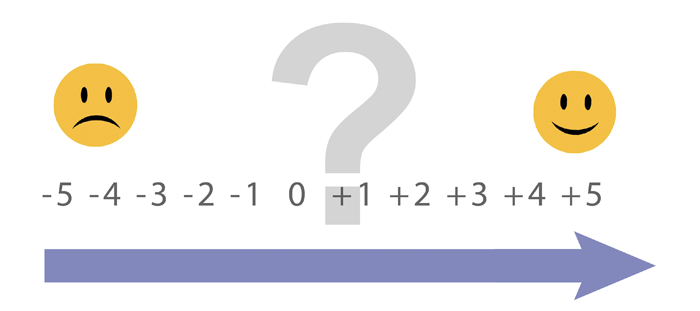By Dr. Larry Cole
Let’s begin this psychological journey with discussing our internal chatter, e.g., it has been said that we have 50,000 independent thoughts a day. Our brain continues to talk to us spontaneously throughout our waking hours. You’re not going to shut your internal dialogue down. Thus, this article focuses on using this psychological phenomenon to our advantage during the tough times in our lives.
Throughout the day our thoughts and, therefore, our attitudes are going to cycle between being positive and negative. The interesting dilemma is that our default attitude at birth is one of happiness. Living, though, takes its toll. It’s been estimated that 80% of adult thinking is negative in some fashion. Using the following continuum, each of us has a default position on that scale. Where would you put you? Where would your family and employees put you?
It may appear that negative thinking is not necessarily a friend. But a closer examination of the role negative thinking plays in our life’s highlights shows it is designed to protect us from either physical or psychological harm. That’s a story for another time. It has also been suggested that negative thinking prevents us from being Pollyanna-ish.
Fast forward to today. We’ve been faced with and are living through a worldwide pandemic. (I’m using the pandemic as an example, but the psychological muscles introduced in this article apply to any stressor.) What do our thoughts tell us about ourselves? Yes, our initial thought response is probably one that would be categorized as negative, e.g., “Dang, I hate this.” We might not be able to control this initial thought, but what is our second thought to our initial thought? Because this one is under our control. Do we dwell on the negative aspects or accept it and make the best of it? What does this second thought tell us about ourselves?
Remember that 80% of our thoughts are negative in some manner so it would be very easy to simply continue that line of thinking to focus on the negative aspects of COVID-19.
Learning Points
Learning Point Number One: Continuing to focus on the negative would suggest you tend to be a negative thinker and reside on the left side of the continuum.
Learning Point Number Two: If you are one of the lucky ones who can very quickly shift from accepting the fact the COVID-19 virus is disrupting your life to finding ways to enjoy life during this pandemic, then you may be one of the more positive thinkers with a default position on the right side of the continuum.
If you are asked if you want to be sad or happy, my guess is that you would pick the latter over the former. The fact is negative and positive thinking are mutually exclusive, so we will not be happy thinking ugly thoughts.
Learning Point Number Three: Do you have the necessary self-control to shut off your internal switch of negative thinking and to turn on your positive one? You do that by directing your thoughts to the more positive characteristics in your life. Remember the cliché: We are what we think about most.
Let’s leave the COVID-19 world for a moment while I mention a former colleague and dear friend who suffered a devastating stroke 10 years ago that left him partially paralyzed. In the words of Dale Carnegie, How to Win Friends and Influence People, he learned to accept the worst that might happen and enjoy the daily blessings life has to offer.
Let’s look at positive thinking from another perspective. As mentioned, research shows our default position may be a 1:4 ratio of positive to negative thinking with 80% of our thoughts being negative. Barbara Frederickson, in her book, Positivity, introduced the notion to strive for a 3:1 ratio. To do that, look back to Learning Point Number Three: We become aware of our propensity to think negatively, shut off that switch and turn on our positive switch by thinking about the blessings in our lives.
Learning Point Number Four: Like any other muscle, this psychological muscle becomes stronger with focused practice.
Learning Point Number Five: In paraphrasing the words of a recent politician — the challenge is not simply to win the battle with the COVID-19 virus, but to ensure that this experience teaches us how we can be better and to prevent future viruses from having this enormous impact.
The bottom line is to take advantage of the adverse events in our lives by using them to become a better person – or nation. Shame on us if we don’t.
Learning Point Number Six: The worldwide pandemic is bringing the world closer together as everyone fights the same enemy. The lessons for all of us are: 1) the collective intelligence is smarter than any one individual, and 2) the degree of cooperation in the scientific community tells us that collectively we can achieve more than individual nations. It’s just a shame that it takes an emergency to remind us of these basic facts.
In closing this article, you need to know numerous studies have shown positivity leads to improved health, thus longevity, more and closer friendships, improved personal and professional productivity, and positive people make more money.
Now you have it. What are you going to do with it? Your choice.
Larry Cole, Ph.D., is founder of TeamMax a consulting company that helps people work together. Please send questions and/or comments to Larry at teammax100@gmail.com.

